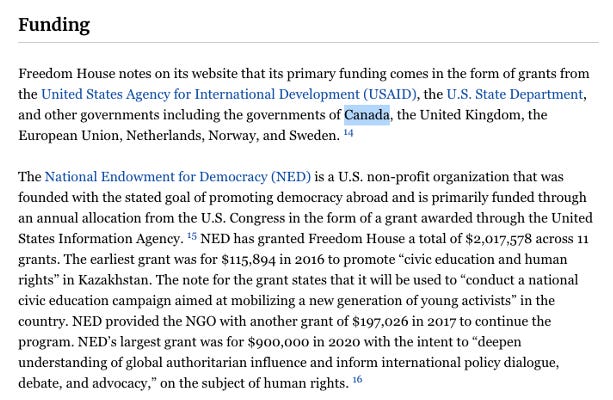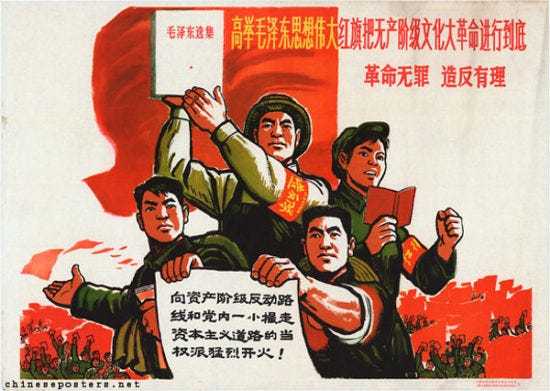“I hate all of our leaders.”
That’s what I said on Canada Day, in a moment of frustration. I had been listening to people talk to how great Canada is, and made the mistake of saying this to people who remain stubbornly propagandized and continue to turn to state and oligarch-funded media for guidance about understanding Canada and how we are perceived around the globe.

Because I was being critical, I became the subject of a lecture. I’m overly negative. I ignore that some political leaders are trying their best. If I don’t stop being negative, no one will ever listen to me. My language and tone are dangerous. I’m rude. I’m not fair. It’s wrong for me to speak this way.
It’s incredibly frustrating because propagandized people don’t even understand the extent of what our leaders have done, because the MSM is not informing them. In addition to their participation in globalist corruption, both Trudeau and Carney’s Liberal governments have also lied and are still lying about the arms embargo. Last year Canada shipped $18.9 million in military goods directly to Israel. Like our previous Foreign Affairs Minister Melanie Joly (who remains in Carney’s Cabinet), our new Foreign Affairs Minister Anita Anand has also expressed “unwavering” support for the terrorist state as the genocide goes on. Carney has stated that the only Palestine Canada would support would be a Zionist Palestine, which is the same thing as telling the Jews in the Holocaust that they are required to support Nazism. The government is also still sending billions to Ukraine without Canadians’ permission. This will extend the proxy war even as the majority of Ukrainians themselves want it to be over, and will not only kill many more people but also put increasing financial strain on Canadian taxpayers, who are already struggling as is.
The destructive will of the empire takes precedence over the concerns of citizens who live here. It is acceptable to be angry about this. But because my opinions and tone are seen as rude and overly negative, I am perceived as unpatriotic and lectured into silence. The content of my opinions is ignored. I must sit there in silence as propagandized people harmoniously affirm each other’s opinions. I listen as they share Freedom House’s 2025 World Freedom Report amongst themselves. Look how free and amazing Canada’s score is! They say. Never mind that Freedom House is inherently biased and receive the majority of their funding from Western governments and sources like NED, which have funded colour revolutions across the globe. No wonder they give themselves great scores. Yemen received a score of something like 10 out of 100 even though Yemen is one of the only countries in the entire world that is actually fighting for Palestinian freedom. But I suppose they’re not free in that correct, Western way.
So I’m the one who gets shut down and silenced, because I wasn’t being perfectly nice and polite about my delivery.
This is a phenomena that I don’t think people always understand is a problem. I call it the Decorum Problem, or the HR Effect. The way in which you say things gets more focus, attention, and criticism than the source or content of what you are talking about, even if that content includes murder, violence, propaganda, imperial corruption, and warmongering.
You see this HR/Decorum Problem everywhere. It’s in this interview with Bassem Youssef, who advocates for ending genocide while his Zionist opponent scolds him for using the word “fuck.” It’s in the National Post, whose top headline on Canada Day was about Bob Vylan being “mean” to genocidal IDF soldiers at Glastonbury, while there was not an article in sight about how many children Israel killed in Palestine that day. It’s in the complaints of Zionist students at Columbia who claimed it’s anti-feminist to say “Zionists get no bitches” while remaining silent on the daily murders of innocent Palestinian women. It’s in that incident with Max Blumenthal and Sam Husseini, whose pleas for peace were ignored while they were lectured on “proper procedure.” It’s our culture’s general insistence on niceties, tone, and polite language in the face of a global crisis. People are condemned for language and manner in which they express anger and sorrow, while the sources of anger and sorrow get off scot-free.

Me saying that I hate all of our leaders isn’t super controversial. I have limited power to stop what our leaders are doing. All I have is the right to express dissent, even if the tone is perceived as rude.
The Decorum Problem can be seen across the West, and is a significant issue in Canada. This is for a few different reasons. Though I know I am biased in saying so, Canada has some of the shittiest mainstream media in the empire on both the right and left, which prevents unawakened people from being properly informed. Canada also considers itself more collectivist than countries like America, where our cultural focus is more on collective harmony that individualism. Our desire to be culturally polite, nice, and civilized in our communities means that we are scolded if we raise our voices, but this prevents us from holding our leaders accountable or communicating urgency. And lastly, Canada’s culture has been dominated by liberalism for over a decade, and one of the tenants of contemporary liberal philosophy is that citizens must utilize agreed-upon language and terminology in order to convey one’s own decency, moral fibre, and compassion for others.
I actually believe that Westerners will look back on this time as our own version of a Cultural Revolution, comparable to the one in China in the 60s to 70s, which divided people ideologically even within families. The Cultural Revolution involved the enforcement of a state-approved morality, and there were those that dissented. For Westerners, there is also a rigid sense of morality endorsed by the state, but the hypocrisy of this is becoming known. As such our cultural revolution so far seems like a kind of counter-liberalism cultural revolution, whereby people are beginning to question certain tenets of liberal ideology, which has dominated the West for most of my life and insists it is objectively the most moral ideology. I too have espoused liberal philosophies and ideologies for my entire life, since Obama replaced George Bush in the White House. I too policed language, believing we needed to agree upon terminology in order to live in the kindest version of society.
These philosophies however are now being attacked, because leaders who espoused liberalism have been ruling the world since I was a teenager, yet the world has quite clearly not become a kinder place. The hypocrisy of those who espouse “kind language” and “morally correct terminology” while engaging in policies that hurt or kill people has exposed the problems with this framework. It’s the Ellen DeGeneres effect, whose motto was “Be Kind” while reportedly leading an extremely toxic workplace. Within liberalism, the focus on language can be weaponized to conceal oppression, divert attention, and censor; Western leaders scold us like schoolteachers for being “mean” or “offensive” while they pay to bomb literal babies and psychologically manipulate their populaces into cheering for extensions to a deadly proxy war. The focus on language can be viewed as a distraction from actual reality.
This is now contributing to the cultural backlash, whereby people become even more angry and even more “offensive” and forceful in their language. Changing speech patterns disruptively is uncomfortable, but can also be interpreted as a challenge to soft power, to attack those that choose to police language while remaining silent on other major problems that are ultimately more harmful.
There are a series of accounts on X for example called “Retard Finder” that are attacking corruption amongst globalist elites. If you are a leftist that is not on Twitter, it is possible that me even writing this word will be a bit of shock. Like me, you have been adhering to liberal ideology for the past decade, and have removed this word from your vocabulary based on the principles of language in leftist ideology that I described above. The brand of liberalism we have grown within insists on the importance of not using language that could hurt someone’s feelings. In the case of this word, it might hurt the feelings of someone who has intellectual disabilities or someone close to one with disabilities.
I don’t endorse everything these accounts say (ironically some of them still have “retarded” opinions about Palestine), but I think it’s a good example of this phenomena, this counter-cultural challenge to a soft power that has indisputably been dominant prior to Trump’s second election. The word is being used deliberately to offend, to challenge the role of language as a tool of control. Language can control narratives, silence dissent, and enforce a perspective on morality that is actually more subjective ideologically than objective. It is thus a deliberate tactic to disrupt a familiar dynamic, and emphasize frustration with censorship in a way that elicits an emotional reaction. These accounts are attempting to demonstrate that elites, globalists, and politicians are the ones causing true damage, while their use of an offensive word cannot literally hurt anyone as much as the policies of these powerful people.
It is not untrue that X is a cesspool of anger and toxicity. But some time ago, this negativity led to many people departing X for Bluesky, which describes itself as a “less toxic” place than X. While this is not false (people can be incredibly vicious on X), this kind of content is more representative of content on Bluesky:
while, due to X’s focus on “freedom of speech,” you are more likely to regularly learn about things like this:
I’m of course being hyperbolic to prove a point; you can still see innocuous content on X, and just because X has less censorship does not mean the platform is without it or that Elon Musk is worth trusting. But at least at the time of this publication, it is easier to share this kind of information there than other platforms. While the information may be angry, negative, or toxic, X currently allows more freedom to share things that disrupt the status quo in a way that is helpful to challenging systems of power.
People are beginning to notice this change, as the anger online leaks into the real world. This perhaps helps to explain why people were concerned with my “I hate all our leaders” comment above. I do understand the discomfort; is an uncomfortable phenomena we have to navigate. But our discomfort does not change that it will continue to happen, and I hope this will help people understand why it is happening.
I’m a social worker, so I help teach some conflict resolution skills, and one thing that is indisputable is that you will never get anywhere in an argument if your argument is pure invalidation of a person’s concerns. It doesn’t matter what those concerns are. While it is preferable to be able to deliver your concerns in a matter that is calm and unaggressive, if you continue to consistently invalidate a person’s concerns, negative emotions like anger are likely to exacerbate, and the conflict is less likely to get resolved. Those that are already angry will double down on their anger. The “toxicity” you see on X thus can be perceived as a reaction to those who have not felt like they have been heard, whether or not you want to defend the content of what they are actually saying.
This essay is not an endorsement of any and all cruel, rude, offensive, or negative language. It is however a cultural observation that cannot be ignored, and is worthy of discussing. We are now living in a reality where people are scolded and criticized for their negativity or rudeness while little has been done to address the source of that negativity. X represents what happened to our society because people didn’t feel supported by society or validated in their concerns—the anger grew, the sadness grew, and now many people are disrupting dynamics on purpose to express dissent.
Some things that can only be suppressed for so long. As long as violence is discouraged, the negativity in itself is not as dangerous as the system would like you to think. It is the system that is dangerous, which is why it must be attacked.
While we should all do our best to remain calm during this crisis, anger does not disappear if one says, “don’t say it this way, don’t say it that way, don’t say that at all.” Censorship wallpapers over or demonizes complainants rather than addressing the source of the pain. The source does not disappear just because one polices the language in which one describes it.







For the record, Eleanor, I don't like any of our leaders either and I'm Canadian. And, I agree, we do have a decorum problem. We should be able to criticize the government and acknowledge that none of the current leaders represent us our our interests.
I couldn't have said it better myself Eleanor ;-)
l'd like to know when exactly Canada went from being a country full of thoughtful, kind and considerate people that cared for our neighbours to a country full of individuals afraid to speak their truth, protest and forced to self-censor before expressing their thoughts, feelings and concerns.
I think it might have been a result of the Covid pandemic five years ago when those of us that questioned the "science" were gas-lit and told to shut-up, wear the mask, stay home and take the shot(s). Perhaps it was ten years ago when Canadians elected an idiot as our Prime Minister and our southern neighbours elected a bigger idiot as their President?
But, yes l too "hate" feeling that we were lied to by politicians and the so-called medical professionals while our MSM deliberately withheld vital information from us.